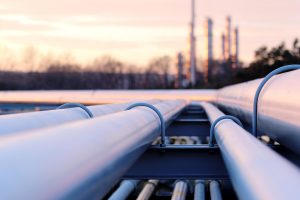 New peer-reviewed research published this week in the Proceedings of the National Academy of Sciences finds that methane emissions from natural gas infrastructure and buildings in the Boston area have remained consistently high over the last eight years, despite multiple programs aimed at reducing methane pipeline leakage.
New peer-reviewed research published this week in the Proceedings of the National Academy of Sciences finds that methane emissions from natural gas infrastructure and buildings in the Boston area have remained consistently high over the last eight years, despite multiple programs aimed at reducing methane pipeline leakage.
This study indicates that more action is needed in Massachusetts and around the country to tackle the urban methane problem.
A potent greenhouse gas and the primary component of natural gas, methane has at least 80 times the warming power of carbon dioxide during the first 10-20 years after release. Emissions from oil and gas operations, livestock and other industries are responsible for at least 24% of current global warming.
What they found
Harvard University scientists, in collaboration with other academic institutions and EDF, conducted a top-down study of methane emissions across the Boston urban region from 2012 to 2020. Using sensors and a high-resolution transport model to track the methane, they found methane concentrations were higher than previously estimated, and remained elevated throughout the study period.
New research shows Boston methane emissions continue, despite pipe replacement efforts Click To TweetThey report that emissions from the Boston-area natural gas system are three times higher than state inventories previously indicated. This is consistent with earlier studies across six other U.S. cities, which found gas system methane emissions were two to six times greater than inventories reported.
The findings also raise another concern. Gas pipelines operate at a constant pressure, so leak rates tend to remain constant no matter how much gas flows through the system. Conversely, the emission levels found in the study fluctuated in step with gas consumption, suggesting that methane may be escaping from buildings and appliances on the customer side of the meter, after gas has left the distribution system.
During the study period, Massachusetts gas utilities spent $2.3 billion in ratepayer funds replacing old distribution pipes under a program approved by the state legislature with the aim of replacing the leakiest pipes. Yet methane emissions in Boston have remained high despite significant investment.
Implications for pipe replacement efforts
A recent analysis of Massachusetts’ pipe replacement program found that it is likely to cost $20 billion by 2040. Gas customers will be paying off those costs for decades to come.
As gas utilities prepare for the transition to clean energy and increased electrification, eye-popping figures like these underscore the risks of over-investment in fossil fuel infrastructure that could be rendered obsolete long before its expected life is up.
EDF has raised concerns about the state’s existing methane standard with the state Department of Environmental Protection.
MassDEP currently requires gas utilities to report year-over-year emissions reductions, but the framework is tied exclusively to pipe replacement; they don’t have to demonstrate actual reductions in methane emissions. Utilities simply report the amount of pipe replaced with new material, without regard for actual results — while continuing to expand their gas systems.
A better way
The existing standard disincentivizes gas utilities from focusing on leak repair efforts, which can be cheaper than full-blown replacement.
Instead of focusing solely on expensive pipe replacement, gas utilities should use advanced leak detection technology and data analytics to identify the largest sources of methane leakage on their systems, prioritize leak repairs and track the outcome.
Research has shown that ALD+ can find 66% of gas leaks that traditional survey methods miss, and it can yield a systemwide leak flow rate to quantify methane emissions based on observations (rather than bottom-up estimates).
Rather than giving utilities a free pass to spend billions of dollars on questionable pipe replacement, EDF has recommended to MassDEP that the agency should require utilities to use ALD+ and demonstrate declining methane emissions through leak repair. Additionally, utilities should identify opportunities to retire leaky gas pipes as building electrification programs reduce demand for gas.
Massachusetts has well-intentioned programs that were designed to reduce methane emissions from the gas distribution system, but as these programs prove to be ineffective, the state should consider new approaches to ensure alignment with climate goals.